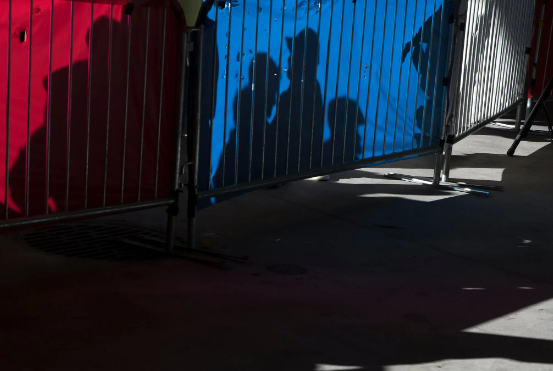
斯蒂芬·克劳利/《纽约时报》
我们每天发表一篇文章,以表彰第四届年度学生社论大赛的前 10 名获奖者。
下面是弗朗西斯卡·凯利(Francesca Kelley)的文章,18岁。
In Nothing We Trust
Like many American children, I have, at one point or another, dabbled in door-to-door sales. I eventually graduated from peddling Girl Scout cookies with my mom to knocking on my neighbors’ doors alone, attempting to lure them into supporting my high school marching band with citrus fruits. However, selling alone, I soon encountered a problem: I knew almost none of them by name. Additionally, even after explaining that I lived just down the block, I often noticed the homeowner eyeing me with suspicion, questioning what business I could possibly have on their front porch.
Gone are the halcyon days of perpetually unlocked doors and packs of unsupervised kids roving the neighborhood. America has entered a new era: the Age of Mistrust. Nowadays, suburban homes are outfitted with security systems fit for federal penitentiaries, and children aren’t allowed out of the house without a chaperone. It is no coincidence that as we have lost trust in those around us, loneliness levels have also been on the rise; whereas between 11 and 20 percent of people frequently felt lonely in the 1970s and 80s, that number is closer to 40 percent today.
Unfortunately, the disease of mistrust hasn’t just been eroding our happiness. The American public is also rapidly losing faith in its most valued institutions. Today, in the country that once considered the newsman Walter Cronkite “the most trusted man in America,” only 32 percent of people have a “great deal” or “fair amount” of trust in the media. According to the Pew Research Center, an abysmal 19 percent of Americans trust their government. So where did all our trust go, and how do we get it back?
In a bygone America, neighbors relied on each other to watch the kids or borrow some sugar. The moment we started locking our doors was the moment we began to lose faith in what once made our country great. Social scientists have noticed the steady decline in interpersonal trust has led to an inability “to engage in spontaneous, voluntary cooperation.” What it boils down to is this: when someone can’t even trust their neighbor, how can they trust their president, or a refugee from a foreign land?
As bleak as the situation may seem, we can learn to trust again. Communities across America demonstrate the possibilities every day, whether by rallying around a local child fighting cancer, or organizing a fund-raiser to help feed the homeless. Trust is key; a community can’t unite for the common good without believing in each other.
America has lost its way, but the solution is simple: love thy neighbor.
Works Cited
Elving, Ron. “Poll: 1 In 5 Americans Trusts The Government.” NPR. NPR, 23 Nov. 2015. Web. 21 Mar. 2017.
Entis, Lauren. “Chronic Loneliness Is a Modern-Day Epidemic.” Fortune. 22 June 2016. Web. 21 Mar. 2017.
Heath, Joseph. “Is Trust Still Possible in the U.S.?” The New York Times. The New York Times, 08 Nov. 2016. Web. 21 Mar. 2017.
Levine, Cecilia. “Community Rallies For Fair Lawn Girl, Cousin Both Fighting Cancer.” Fair Lawn-Glen Rock Daily Voice. 01 Apr. 2017. Web. 03 Apr. 2017.
Slade, Shelby. “Bowls for Humanity Rallies Community, Artists around Helping Homeless.” Daily Herald. 01 Apr. 2017. Web. 03 Apr. 2017.
Walsh, Kenneth T. “Distrust of Media at Highest Level Ever.” US News. 15 Sept. 2016. Web. 21 Mar. 2017.